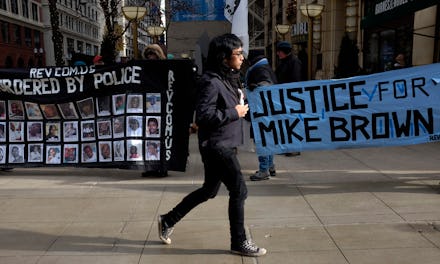Think Race Doesn't Matter in the Ferguson Decision? Check This Chart

In the wake of protests in Ferguson, Missouri, that followed a grand jury's decision to clear police Officer Darren Wilson in the shooting death of Michael Brown, many Americans are working to parse the role race played (or didn't play) in both Brown's death and the way the criminal justice system handled the subsequent investigation.
Many seem convinced that race is irrelevant. At National Review, columnist Dennis Crager argues that what happened in Ferguson was a moral issue, not a racial issue. In August, during a Fox News segment, author Ben Carson questioned whether race was the most important factor. "I'm not sure that this is a police versus black community issue," he said. "We need to start looking at bigger issues here." And after Brown's death, Rush Limbaugh accused the Democratic party of playing the race card in order to sway midterm voters.
Except... One chart swiftly and cleanly takes down these arguments.
The racial disparity is "astounding," as Pew researcher Jake Grovum put it on Twitter. Some 85% of black Americans disapproved of the grand jury decision, compared with just 9% who approved. White Americans, on the other hand, were much louder in their support — 58% approved of the decision, versus 35% who didn't.
When it came to potential civil rights charges against Wilson, the numbers for black respondents were almost identical: Eighty-five percent of black respondents were in favor, and only 12% disapproved. Only 38% of white respondents, on the other hand, approved of charges.
Race clearly does matter, not only through the lens of what happened in Ferguson, but also in how Americans react to it. Skin color shapes perception, whether we want to admit it or not: A recent study in the Journal of Personality and Social Psychology confirms that attitudes about race shape our actions, even when we're not aware of it. And as Brandyn Campbell wrote for Philadelphia magazine, "proclaiming that you don't see race in Ferguson case ends the conversation before it's begun. It bars the possibility for self-reflection and with it, any chance of finding a core of commonality and compassion."
It's not just about public opinion: At some point, opinions and perceptions become secondary. While it's true that measuring public opinion has value, it shrinks in comparison to the factual and empirical evidence — which is, in a word, indisputable.
If you really think race doesn't matter in Ferguson, consider that young black men are 21 times more likely to be shot by police than their white peers. Or the fact that in 2011, the New York Police Department stopped young black men more times than there were young black men in the city itself. Or that the United States currently incarcerates a much larger portion of its black population than South Africa did under apartheid.
Public opinion doesn't matter in proving that the justice system has a race problem — the facts alone should speak for themselves — but public opinion matters in changing the status quo. Thankfully, Americans may be more ready than ever to have an honest discussion about the relationship between race and justice. According to a survey by the Public Religion Research Institute, 56% of Americans now disagree with the assertion that the criminal justice system treats whites and minorities equally, up from 47% in 2013.
This much is clear: We've still got a long way to go, and Ferguson has thrown the flaws of our current justice system into sharp focus. Between the facts themselves and the racial disparities in public opinion, the divide is there, and anyone who pretends otherwise is fooling themselves.
The first step to repairing a rift is admitting it exists in the first place. It's about time we arrive in a place where we're ready to do that.